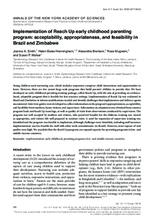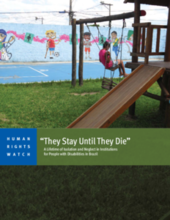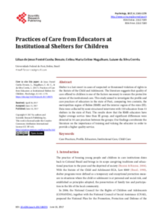Displaying 51 - 60 of 84
This paper presents an evaluation of an early childhood parenting training package implemented in Brazil and Zimbabwe, called Reach Up, with the aim of providing an evidence‐based, adaptable program that is feasible for low‐resource settings.
This report documents a range of abuses against children and adults with disabilities in residential institutions in Brazil.
The purpose of this study was to understand the perspective of caregivers about the formation and disruption of bonds with institutionalized children in Brazil.
This chapter aims to discuss the methodological implications of research with children and adolescents who are living in foster care, with emphasis on the use of visual methods and reflexive interviews.
This chapter aims to present a research grounded in the bioecology of human development that analyzed shelter institutions through the perceptions of children aged from 7 to 12 years in Brazil.
On 18 September 2017, the Sexual Violence Research Initiative will hold its 5th international conference, the SVRI Forum 2017.
This study aimed to investigate the profile and care practices of educators teaching at institutional shelters for children in the state of Pará, comparing two contexts, the metropolitan region of Belém (RMB) and the interior region of the state (IE).
The National Movement for Family and Community Coexistence, through its Executive Secretariat - ABTH, member of the RISE Network in Brazil; the Special Secretariat for Human Rights; the National Council on the Rights of Children and Adol
This chapter aims to (1) review results of recent studies, conducted in different countries, on the subjective well-being of children; (2) provide an overview of residential care in Brazil; (3) discuss recent research findings from the Research Group on Community Psychology (GPPC) of well-being in children in southern Brazil; and (4) discuss the specifics of the research context with children on state protection.
This article shows that little has been done to change the situation for street children in Salvador.



